Brian Go was a young boy of 10 when he realized the great expectations his father had of him.
Every night at the dinner table, his father, James, excitedly talked about his day, primarily about the family business that was the Gokongwei Group.
“He’d be talking about the business. Not the details or intricacies of what exactly he was doing, but the reasons why he finds things interesting, why he finds purpose in doing things. It’s been like that since I was a young boy,” says Brian of his father, James L. Go, chairman of JG Summit Holdings, Inc.
Brian says he was never pressured to join the business, but was encouraged to follow in the footsteps of his father, his uncles, and his older cousins.
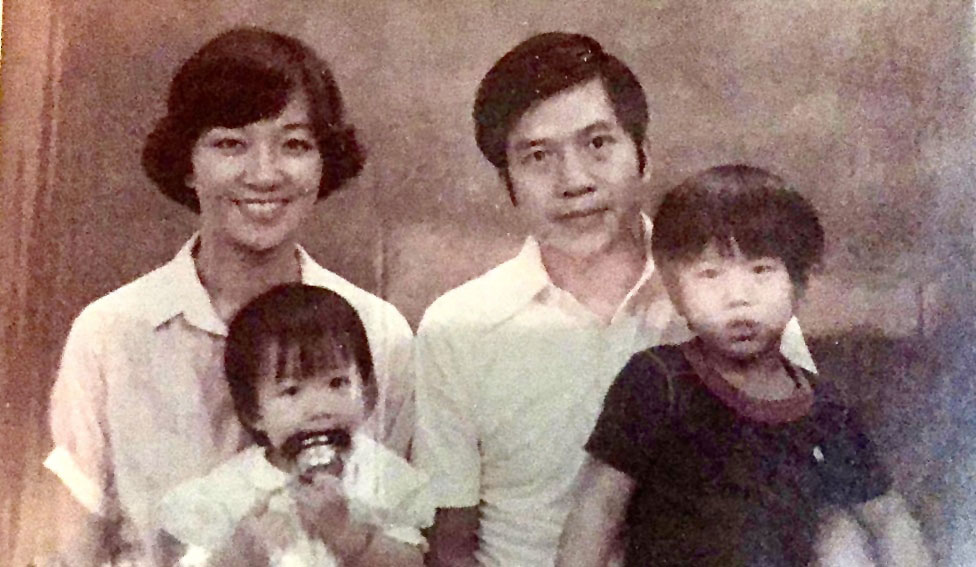
“I’ve always known that the business was something my father was very excited about, and I knew he would be very excited if I wanted to be involved in it,” says Brian. “It was always painted that way, as a future option, not as a demand. And so all through high school and college, I knew I had that option in the back of my mind, not as the only option, but as the preferred option.
“If it had been a demand, then I could’ve rebelled and said, I don’t agree. I want to do something else. But if the choice appears to be the best option, then why not?”
Four decades later, Brian is the chief finance and risk officer at JG Summit, set to mark his fiftieth year in December.
We’re sitting in his spartan office unmarked by any personal details. Just a standard desk, some chairs and several shelves with files. Even the walls are bare, bereft of art, and even of color.
The floor will be renovated soon, Brian explains, so he felt no need to spruce up the space when he moved in back in February of 2022. He also works from the Philippine office only 10 days a month, with a weekend in between. The rest of the time he works from Singapore, where his wife, Jackie, and children reside.
Brian says his kids are used to their father commuting back and forth, since there was a three-year period when he was based in China and they used to see him only on weekends twice a month.
“That was not a good situation. It was so hard being away from my family. I felt very disjointed,” said Brian. “It gives me a lot of sympathy for how OFWs live, apart from their families for much longer periods of time, years even. It’s very difficult.”
At this point, he says his family feels settled in Singapore, where they’ve lived since 2014.
“It’s one of the easiest places to adjust to, it’s like a melting pot for Southeast Asia,” says Brian. “I try to look at it in a bigger sense. Our home is Southeast Asia. It’s all part of our world.”
Singapore has been home to Brian for the last nine years, after previously spending a decade in China, and before that, in the U.S. and in the Philippines, where he grew up.
“I’ve had many moves in my life, and there was always that trepidation before relocating, but there were always opportunities in new places,” says Brian.
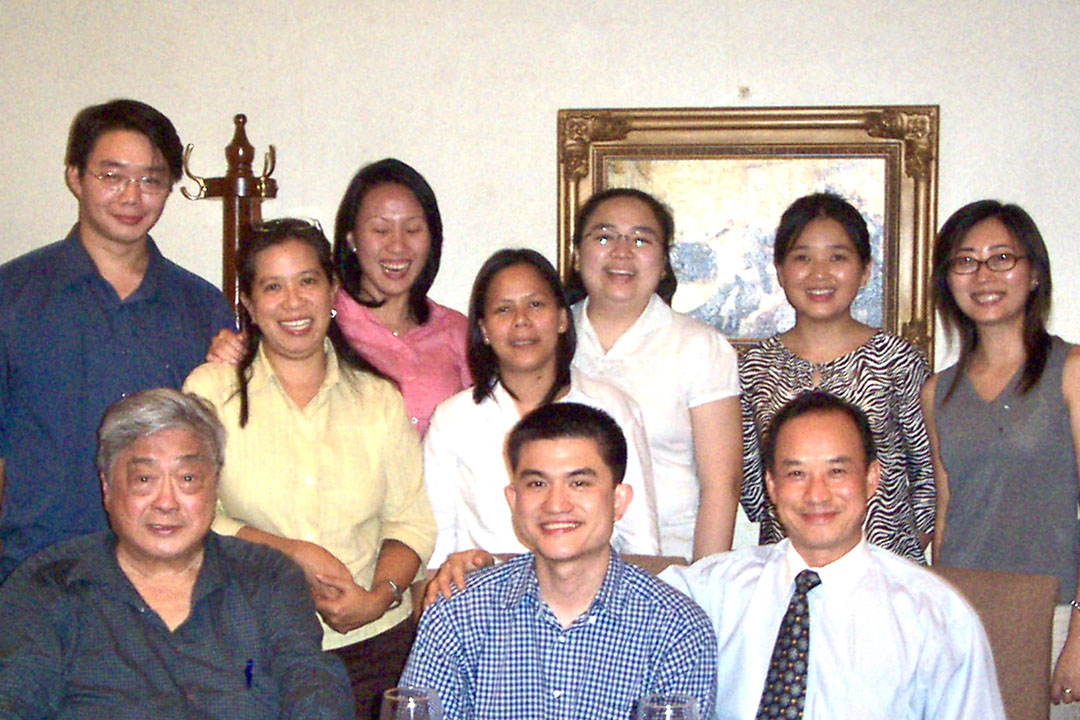
Brian first moved to the United States when he was in high school, and he and his sister, Karen, went to St. Paul’s School in New Hampshire.
After graduation, Brian went to Harvard University, where he majored in Economics.
At the time, he worked for a professor at Harvard Business School, whose field of study was biotech. Brian helped him produce a report on the ecosystem in Boston that was thriving due to the boom in biotech companies, including Genentech, which later was bought by Roche. And then there was Amgen, now one of the world’s leading biotechnology companies.
“They were all just starting out then, now they’re humongous. Imagine if you had joined one of those companies back then!” says Brian. “A few years later the same thing happened in Silicon Valley. I was an intern at a consulting firm, and one of my colleagues was raving about a company she was working with called Yahoo, which she said was going to overtake Netscape as a search engine. Of course, this was before Google.”
After he graduated from Harvard in 1996, Brian worked for a year and a half with Booz Allen Hamilton, a management consulting services company based in New York.
“Those were exciting times. We were in consulting and we were working with big companies trying to help them improve their business operations,” he says. “I was enjoying myself and could’ve imagined myself staying.”
But then the Asian financial crisis hit.
“It didn’t seem like a big thing in New York since we barely felt it over there. But my Dad talked about how the business was affected,” says Brian. “How the peso had devalued by half, how the business had a lot of foreign debt, and how on paper, their assets were less than their liabilities. It sounded really bad.”
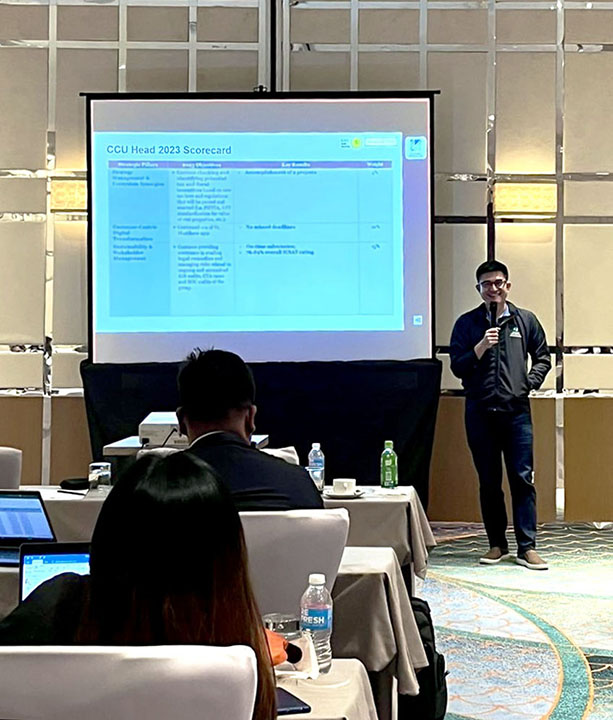
Brian says it sounded like the business was in a very tough situation, so he felt the need to go back and try to see how he could help.
In the end, with strong leadership and management teams, the business came out of the crisis quite strong, and at that point, Brian was already settled back home.
It's noon, and we head to the mall for lunch, where we decide on Pancake House, a childhood favorite, Brian says. We each order two tacos and a side of crisp waffles.
“What’s your unlimited drink?” Brian asks the server.
During his first six months back in Manila in 1998, Brian says he rotated with different businesses in the Gokongwei Group, getting exposed to the different facets of the business. He had short stints with Robinsons Bank and Robinsons Retail Holdings Inc., as part of his initial orientation.
Afterward, Brian took on a full-time job with Digitel for five years, first in corporate planning, and then managing the data communications business.
“Technology was fun. I did my first M&A, trying to buy Eastern Telecommunications, but it didn’t push through. In the end we did a joint venture with Asia Global Crossing. We created a new landing station for data and cable in Naic, Cavite. It was fun stuff,” says Brian.
Unfortunately, there was overbuilding in the market, and the data business became an overly competitive sector. In his last year, Brian said they saw the whole market was going toward mobile.
“We didn’t participate in the first round but we were in the second round to get a mobile license. I participated about six months in that build up to Sun Cellular,” says Brian. Sun Cellular eventually became one of the nation’s largest mobile telecommunications companies and is best known for introducing unlimited call and text services in the Philippines.
After five years with Digitel, the opportunity to move to China to lay the groundwork for the group’s expansion emerged, and Brian volunteered to move to the new frontier.
“I now know that Mr. John asked several of the cousins if they wanted to go there but they declined. I was the one who said yes,” he says.
The China years were some of Brian’s roughest ones.
“In China, we were part of a startup operation. We focused on real estate and food. In real estate we did pretty well, and we still have a healthy business there. We built a good team that’s still there,” says Brian. “On the food side, however, the business stayed relatively small. It’s a really tough market if you’re not a local.”
On the personal side, some of the China years were difficult for Brian too. He moved there in 2003 as a bachelor, and soon entered into a relationship with Jackie, who went to Shanghai initially to study Chinese, and later worked there as well. They married in 2006, had a son in 2007, and a daughter in 2010. Not long after, Jackie and the children moved home to Manila. That’s when Brian’s biweekly commute between the two countries began, and lasted for the next three years.
Brian credits his wife for holding down the fort, and keeping the family intact whenever he was away back then.
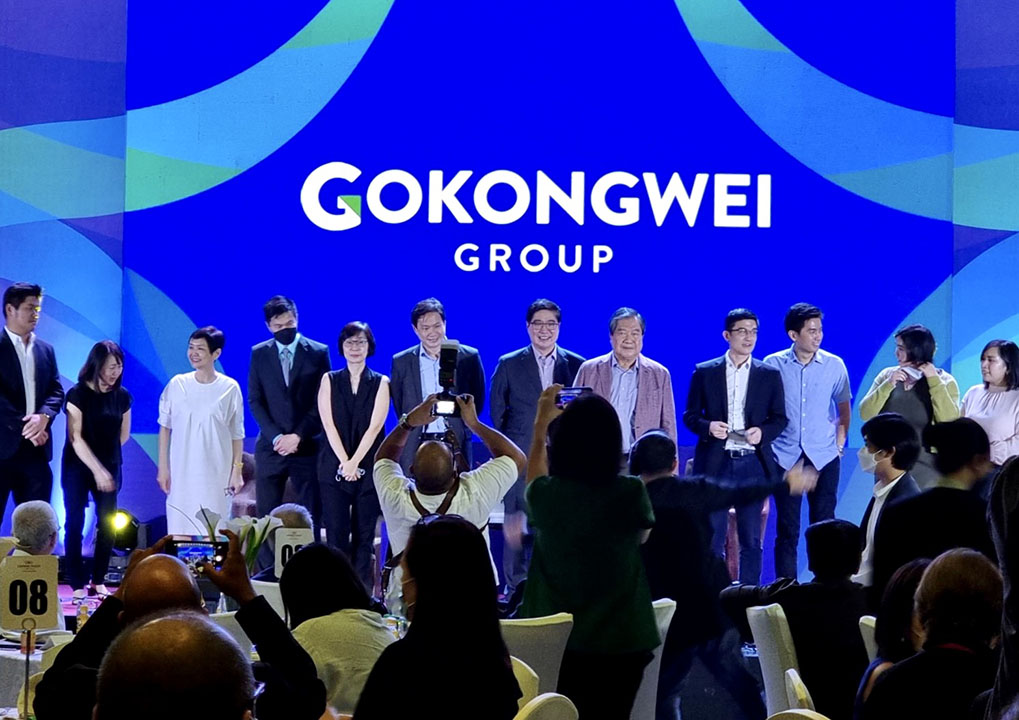
He and the family later moved to Singapore in 2014, where after taking a short sabbatical, he worked for seven years from 2015 with the Gokongwei Group’s food business, Universal Robina Corporation, handling URC Snack Foods (Malaysia) and URC Foods (Singapore), before heading up business development for global exports and new ventures.
Since 2021, Brian has been working again with the head office in Manila, commuting back and forth to Singapore from his office as chief finance and risk officer at the corporate center unit of JG Summit.
It was a big decision again, to leave the cocoon he and his family had woven in Singapore. But the conglomerate was emerging from yet another crisis, this time, a global one that was the COVID-19 pandemic.
“I was energized by the challenge. There was a global crisis and I wanted to contribute meaningfully to the group. There was an opportunity to do so, and that’s what happened,” says Brian. “One of the few advantages of the pandemic was learning to work remotely. We all learned to adapt to hybrid or remote working environments, and that’s allowed situations like mine to become possible, allowing myself to balance work and family. It’s a very fine balance.”
In his current role at JG Summit, Brian works with Treasury, Strategy, Human Resources, and Legal, helping support the different business units in the conglomerate and new builds, spotting where there might be financial issues, and helping resolve them. He also continues to work with URC on strategy, some equity ventures, and occasionally some M&A.
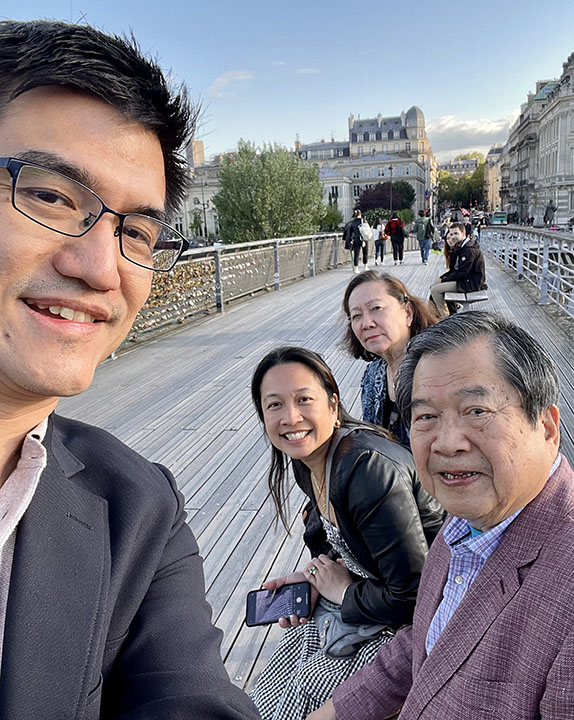
At present, Brian appears to be most passionate about the group’s recent partnership with Maxicare and, related to that, the Gokongwei Group’s healthcare portfolio, which he says is a priority project for him.
“I’m spending a lot of time understanding the business and helping it achieve its full potential, which is a great opportunity for the Philippines,” says Brian, who appears to have found his niche.
“I’m excited by the things that I’m now involved in. The CFO role is a great platform to see a lot of the Gokongwei Group business,” he says. “I’m financially more attuned, and it’s the area where I’m most comfortable. We have very good teams in the different SBUs, and I find comfort in knowing that all the moving parts are working well.”
In this new role, Brian also manages risk.
For financial risks, there are always the fluctuating interest rates and foreign exchange. But he says JG Summit, led by his father, James, as chairman, and cousin, Lance Gokongwei, as president and CEO, with the group’s Treasury team, have done a good job of mitigating these risks for the holding company, as well as for the bigger Gokongwei Group.
“We’ve reduced debt during this period of higher rates, and kept a good balance of short and long term, fixed and floating, and peso and non-peso debt, that varies across all our SBUs at JG Summit, as well as Robinsons Retail Holdings Inc.,” says Brian. RRHI is the Gokongwei Group’s retail arm.
“The layering of the parent, and diversification of holdings also provides a degree of insulation from the possible under performance of any particular SBU,” he says. “And the steady dividend streams from various core investments where we don't have a controlling stake provide additional cushion and risk mitigation.”
And there are non-financial risks as well.
“The war for talent is a big one, not just for our conglomerate, but for the country as a whole,” he says. “Foreign firms employ people for jobs abroad. They don’t even have to move them abroad necessarily, they can do their work remotely from here. That’s a form of competition.”
He mentions how in the airline service industry, foreign airlines are enticing Filipino service crew who are well-trained and who speak good English, similar to what’s been happening in the healthcare industry for years.
Brian says another risk is keeping up with technology transformation, as the world quickly turned to digital technology even more quickly over the pandemic.
Then there are Environmental, Social, and Governance factors, or ESG. Investors the world over are now studying these aspects when looking for growth opportunities and identifying material risks in analyzing potential investments.
“The world has really become a lot more volatile, and how to survive in a VUCA (volatility, uncertainty, complexity, and ambiguity) world is a skill set in itself. We’ve been using different initiatives, AGILE, digital transformation, all building our muscle to respond in an agile manner to a VUCA world,” says Brian. “Being in business is not easy. If you don’t watch it, you can easily get overtaken. When I left telecoms, Nokia and BlackBerry were the kings. Where are they now?”
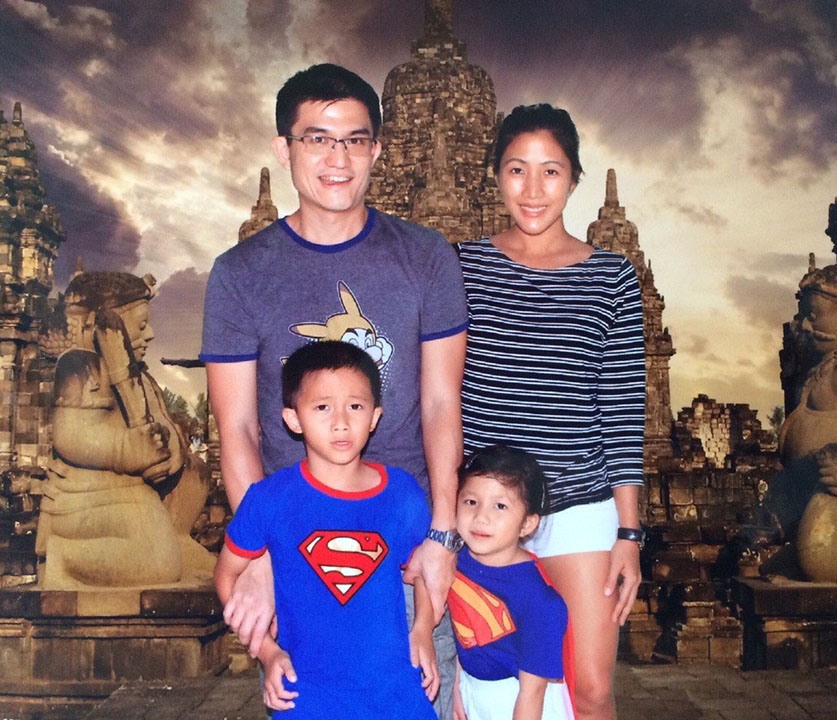
Brian says the family is particularly watchful about two other factors.
“One is making sure we don’t get complacent. When a business becomes relatively successful, sometimes its leaders relax. They lose that edge, that hunger, when the next generation lives off the success of the previous one,” he says. “We always have to be conscious of continuously creating the drive to keep us moving.”
The other challenge, Brian says, is keeping the relevance of the family to the business.
“If possible, we want to encourage more family members to join the business. My cousin Gully Go, JG Summit’s Chief Human Resources Officer, has been working to get the next generation involved,” he says. “He’s been working on exposing them to the business at a young age, and putting together learning and development programs to encourage them to work with us, and continue to be stewards of the business.”
Brian recalls the summer jobs of his youth, working at Don Bosco’s technical school doing a summer internship in machine shop and hydraulics, as the group then operated a textile manufacturing business.
“There was an option to do an internship with a textile maker in Switzerland, but I wanted to be in Manila with my high school friends,” Brian recalls. “I learned hydraulics, worked in the machine shop, learned how to run a lathe.”
Just before college, he worked a summer in the newsroom of the then family-owned paper, The Manila Times. He remembers having to learn how to drive a car with a stick shift so he could go around the city to cover events.
It's these experiences that Brian hopes the members of the next generation get exposed to themselves, although he admits he understands why the younger ones may not be as keen to join the business just yet.
“There are merits of working outside the business. There is the fun of the work, without the burden of both expectation and a sense of responsibility that goes beyond the 9-to-5 job of working for someone else,” he says. “If you’re working for someone else, you assess your contribution based on your compensation and how you enjoy the work. And then you can leave it there and compartmentalize and have the rest of your life.
“But if you’re part of a family business, you have that sense that it’s an obligation to work all the time, and there are these expectations then it changes how you behave,” he says. “As part of the family, I think we all feel we have this responsibility. We care about the business and its longevity. It’s expected of us to be stewards, to take care of the business, and we want to live up to these expectations. It’s a huge responsibility.”
Brian says perhaps members of his generation put the pressure on themselves as well.
“If you grew up seeing your father enjoying his work so much and achieving so much, it’s like you go in and can’t help but think, I should be enjoying it that much, I should also be achieving that much,” he says.
Brian says that over his two decades with the business, he’s learned to love his work more and more.
“It’s a journey, but it doesn’t happen all at once. It’s a journey where you find out what you like and don’t like, and also where you can really add value,” he says. The enjoyment comes from knowing you are adding value, doing something you can hone as an ability, and ultimately finding your purpose.” — Yvette P. Fernandez


